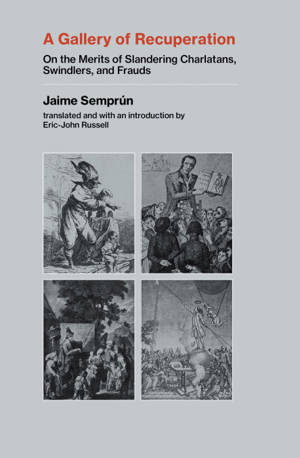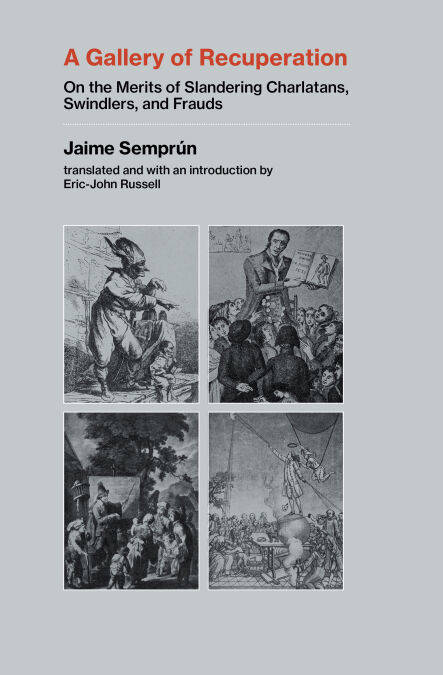
- Afhalen na 1 uur in een winkel met voorraad
- Gratis thuislevering in België vanaf € 30
- Ruim aanbod met 7 miljoen producten
- Afhalen na 1 uur in een winkel met voorraad
- Gratis thuislevering in België vanaf € 30
- Ruim aanbod met 7 miljoen producten
Zoeken
A Gallery of Recuperation E-BOOK
On the Merits of Slandering Charlatans, Swindlers, and Frauds
Jaime Semprun
E-book | Engels
€ 18,68
+ 18 punten
Omschrijving
The first English translation of the French cult classic that lampoons France’s most popular intellectuals of the post-1968 period and their ideas, which became forces of counterrevolution.
Eric-John Russell’s translation of Jaime Semprún’s brutal takedown of France’s best-known intellectuals of the post-1968 period, A Gallery of Recuperation, is one of the first full English versions of any of Semprún’s books. Originally titled Précis de recuperation, the book is a scathing critique of ten major thinkers, including Michel Foucault, Gilles Deleuze, Jean-François Lyotard, and Cornelius Castoriadis. Semprún uses this catalog of careerism to reflect on the concept of recuperation—capitalism’s uncanny ability to coopt anticapitalist critiques and subvert subversion. His central question: What happens to revolutionary ideas, including Marxism itself, in the hands of professional intellectuals?
Semprún’s idiosyncratic and playful style of polemics takes existentialism, humanism, structuralism, poststructuralism, postmodernism, aesthetics, and psychoanalysis to task, casting new light on the figures who have become dominant staples of modern Anglophone academia, and proving the necessity of critiquing intellectuals’ roles within contemporary capitalism. A cult classic among the French radical left and scholars of the Situationist International and May 1968, A Gallery of Recuperation never made the impact it should have. Russell’s translation marks a major step in recognizing Semprún’s work beyond its French context.
Eric-John Russell’s translation of Jaime Semprún’s brutal takedown of France’s best-known intellectuals of the post-1968 period, A Gallery of Recuperation, is one of the first full English versions of any of Semprún’s books. Originally titled Précis de recuperation, the book is a scathing critique of ten major thinkers, including Michel Foucault, Gilles Deleuze, Jean-François Lyotard, and Cornelius Castoriadis. Semprún uses this catalog of careerism to reflect on the concept of recuperation—capitalism’s uncanny ability to coopt anticapitalist critiques and subvert subversion. His central question: What happens to revolutionary ideas, including Marxism itself, in the hands of professional intellectuals?
Semprún’s idiosyncratic and playful style of polemics takes existentialism, humanism, structuralism, poststructuralism, postmodernism, aesthetics, and psychoanalysis to task, casting new light on the figures who have become dominant staples of modern Anglophone academia, and proving the necessity of critiquing intellectuals’ roles within contemporary capitalism. A cult classic among the French radical left and scholars of the Situationist International and May 1968, A Gallery of Recuperation never made the impact it should have. Russell’s translation marks a major step in recognizing Semprún’s work beyond its French context.
Specificaties
Betrokkenen
- Auteur(s):
- Vertaler(s):
- Uitgeverij:
Inhoud
- Aantal bladzijden:
- 200
- Taal:
- Engels
Eigenschappen
- Productcode (EAN):
- 9780262375276
- Verschijningsdatum:
- 31/07/2023
- Uitvoering:
- E-book
- Beveiligd met:
- Adobe DRM
- Formaat:
- ePub

Alleen bij Standaard Boekhandel
+ 18 punten op je klantenkaart van Standaard Boekhandel
Beoordelingen
We publiceren alleen reviews die voldoen aan de voorwaarden voor reviews. Bekijk onze voorwaarden voor reviews.







